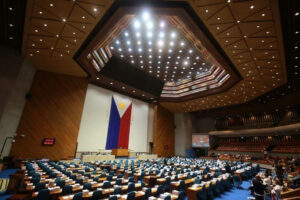
‘Cha-cha’ could lead to bigger problems — legal experts
By John Victor D. Ordoñez and Beatriz Marie D. Cruz, Reporters
THE PUSH to change the 1987 Constitution is a lethal experiment that could plunge the Philippines into deeper problems, constitutional experts told the Senate on Monday.
“Amendments or revisions to the Constitution at this time would be a lethal experiment, a fatal hit, a plunge to death, a Cha-cha dance to the grave or to hell,” Hilario G. Davide, Jr., a former chief justice and one of the framers of the Constitution, told senators.
Congress should focus on cutting red tape and corruption instead of seeking to ease foreign ownership restrictions in the 1987 Charter, he said.
“It is my firm and unchangeable stand that there are no valid scenarios and compelling reasons to amend our 1987 Constitution,” the legal expert said.
“What our country and our people need today are not amendments to provisions of the Constitution but the full implementation of its principles and state policies,” he added.
Lawmakers should instead craft measures to boost the quality of education and address the lack of early childhood care, former Election Chairman and constitutional framer Christian S. Monsod told the same hearing.
Filipino students ranked 77th out of 81 countries in the 2022 Program for International Student Assessment, performing worse than the global average in all categories. The Organization for Economic Cooperation and Development conducts the global assessment yearly.
Mr. Monsod also said the advertising industry, which has largely gone digital, would not benefit from increased foreign capital. The sector is limited to Filipinos.
But former Supreme Court Justice Adolfo S. Azcuna said ownership restrictions on education, public utilities and advertising should not be in the Constitution but should be enforced through regular laws.
“Economic policies should be flexible to meet changing times in the economy,” he told senators. “Other countries that have restrictive economic provisions don’t have them in their Constitutions but in their ordinary laws that can be easily changed.”
Albay Rep. Jose Ma. Clemente S. Salceda earlier said the Senate proposal to open these industries to foreigners would unlock 3.1% in economic output, which he said was not enough.
“Undertaking the amendments would open up the country to higher incomes and better employment for our workers, and greater pride in relation to our neighbors,” former National Economic and Development Authority Secretary Gerardo P. Sicat said at the hearing.
Jose Enrique A. Africa, Ibon Foundation executive director, told senators the government should focus on developing local industries because foreign companies would probably focus on short-term instead of long-term profit.
Also on Monday, Senator Robinhood Ferdinand “Robin” C. Padilla, who heads the Senate committee on constitutional amendments, filed a resolution calling on both chambers of Congress to vote separately on Charter change (“Cha-cha”).
The Constitution provides that changes may be proposed through a three-fourths vote of congressional members. There is a debate whether the Senate and House of Representatives should vote separately or as one chamber.
Mr. Padilla said the framers of the 1987 Constitution intended for the Senate and House to vote separate on Charter change, consistent with the country’s bicameral Legislature.
Philippine senators earlier opposed a proposal for Congress to vote jointly, which they said would dilute the Senate’s vote on constitutional amendments.
‘PEOPLE’S CHARTER’
The Constitution may be amended either through a constitutional convention composed of delegates, by Congress sitting as a constituent assembly or through a people’s initiative.
For an amendment through a people’s initiative, the signatures must account for at least 12% of voters nationwide and 3% of voters in each legislative district.
The Supreme Court rejected a similar initiative campaign in 1997 in the absence of an enabling law.
“Let’s not think that this (changing the Constitution) is a miracle, that when we pass it, investors and entrepreneurs will suddenly come knocking on our door,” Senator Juan Edgardo M. Angara told the hearing. “By all means, let us explore the possibilities.”
Also on Monday, EDSA Lives, a group opposing Charter change, said foreigners are more concerned about the country’s justice system than ownership limits.
“The real problems that we have today have nothing to do with the Constitution,” lawyer Jose Manuel “Chel” I. Diokno told a forum.
The lawyer, who is also the chairman of the Free Legal Assistance Group, said foreign investors are reluctant to enter the country because the Philippine legal system is not fair. “Many are afraid to invest here because they know that if they get involved in a case, they are disadvantaged,” he said in Filipino.
“No one, whether they are for or against Charter change, must be allowed to exploit the Constitution to serve their political interest or agenda,” he added.
The government of President Ferdinand R. Marcos, Jr. should instead address soaring prices, poverty, hunger, criminality, corruption, lack of income and employment and access to the legal system.
“There are many other ways to improve the economy without having to change the Constitution and in so doing, opening it up to so many other vulnerabilities,” University of the Philippines political science professor Francis Joseph A. Dee told the forum.
Michael Charleston B. Chua, who teaches history at De La Salle University, called the 1987 Constitution the “people’s Charter” because it was ratified by 77% of Filipino voters on Feb. 2, 1987.
The Charter decentralized power after the late dictator Ferdinand E. Marcos, Sr. controlled all branches of government under his rule for two decades, he said.
Akbayan Party President Rafaela David said lawmakers could introduce any changes other than economic provisions.
Last month, several congressmen were linked to a signature campaign to amend the Constitution through a so-called people’s initiative.
“Because of all of this, we have trust issues on who should change the Constitution,” Mr. Chua told BusinessWorld after the forum. “If the Constitution should be changed, it should be the people’s will, not any politician’s.”



